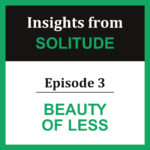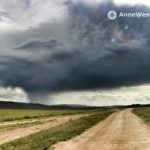Discover the strength in vulnerability. This is likely one of the most personal episodes I will ever record. Handling the tragic accident of a close friend. Experiencing another loved one battling cancer. Approaching the snowy Pamir mountains alone on a bicycle. What do these situations have in common? They show us how fragile life can be. Embracing this vulnerability can leed to a deep respect for nature – and to an even deeper compassion towards others. Join me for this very personal episode.
>> here is the way to the video:
— Transcript of the podcast —
Hello and welcome to the next episode of my podcast ‘Insights from Solitude’. My name is Anne Westwards and I’m sharing my insights and experiences with you that I learned during the year and a half that I spent alone by bicycle along the ancient Silk Roads. Today’s topic is one that is really dear to my heart: it’s about embracing your own vulnerability. What do I mean by that?
The buffer between life and death
Normally, we have this buffer between life and death, which is usually comfortably large: we have insurances, we actually have all the basic needs covered, so we don’t have to worry about having enough food or enough water. Most of us have apartments and jobs. Funnily enough, we still are worried, many of us. Thus, we look for insurances, we want to be on the safe side. So we have contracts for all kinds of things. Rarely in our everyday life are we confronted with this basic insecurity that we we are, as the human species, deeply, deeply vulnerable.
Normally, we don’t have this situation. But now, we actually have to face this, the fact that we might get sick, that loved ones might get sick. We might even die. And that’s very hard to accept and to bear. Don’t get me wrong, it’s the same for me. But if we take a step back, we realize all it takes is one accident. A car which didn’t see you when you are on your bicycle. A stupid accident in your living room. It can happen to all of us, anytime. And no insurance is going to take that away from you, that you are – in essence – vulnerable.
‘Death – that happens to other people.’
Normally, we try to ignore that, to push it away. We talked beforehand about radical acceptance. Our normal mode is to just ignore that this can happen to us, anytime, in particular when you’re young. Of course, when you already have grandchildren and you’re in the final third of your life, maybe this thought becomes something that did you consider more or talk about more? When you’re young, it is more: ‘Death, that is what happens to other people. Illness, sickness is what happens to other people.’
Tragic accidents do happen…
I myself was shocked by the death of a very close friend at the age of 26. We were both avid mountaineers. And we had this beautiful routine where – when either of us had left the country or the continent for doing an internship somewhere else, for studying abroad or just going for a longer vacation – we would then say: ‘Oh, let’s celebrate your return by going to the Alps together!’
Now, this friend of mine, we actually had a phone call the Thursday evening before. I had just returned from North America and I would have joined him for this mountaineering trip – except that the soles of my hiking boots had fallen off. I had spent a long time hiking in the Andes in South America. Back then, I was deeply frustrated when this happened. Because I was in the middle of nowhere in – let me think – in Peru, when the soles of my hiking boots fell off within an hour. Fortunately, I was hiking with a group and I could borrow some spare shoes from a French guy in the group. Still, I was annoyed, to say the least. I was also shocked because I had trusted my equipment.
… and it could have been you
So literally, when Patrick called me that Thursday evening, I told him: ‘Listen, I would love to join you in the Alps. But I can’t. I have no shoes and I won’t have the time to buy new ones and I’m still jet-lagged. I won’t be able to get shoes by tomorrow morning.’ And that was the last time we talked. He and the people he went mountaineering with, they all died on Saturday. And I would have died with them, had I been with them. That’s, you know, one of the things that can just happen in the mountains: if there’s an avalanche of stones, that’s it.
I was 26 at the time and it changed my life dramatically. Because at 26, you don’t actually think about your own death or your own vulnerability. And I think it was the first time that it actually, you know, it strikes you when this thought first arises and you realize: ‘This could have been me. I would be dead right now, had I joined them.’ This changes your whole outlook.
Suffering can create distance
A very good friend of mine survived cancer at a similar age. She’s still one of the people closest to my heart. And it was particularly this time that got us very close. Because, at this age, what often happens is that your friends in your age group, they actually distance themselves from you. You are like an outsider to them because you are an outsider, since you don’t know how much more time you have to live.
Being confronted with that: ‘Oh, there’s somebody in my own age group who might die!’ or in my case: ‘Oh, there’s this very good friend of mine who died completely unexpectedly at the age of 26!’ For most of, that’s very hard to bear and we shy away from this. And that’s a very normal, very human reaction. In essence, we shy away from vulnerability as such. It’s not even death – death is a completely different topic – but just this realization: ‘We are not invincible.’
Leaving the illusion of being invincible
And we’ve moved so far away from this, right? We have – fortunately – in the Western world, we have great healthcare systems (for the most part), we have vaccinations, we have doctors. We are used to the situation where everything – or most things – can be treated, except… and then there’s a long list of conditions which cannot be treated yet or maybe never. But we’re trying to block this thought.
There’s something which changes in you, once you acknowledge that we are vulnerable, you are vulnerable. There is something beautiful that happens. Apart from having to cope with the fact that you may lose loved ones, there comes a very deep humility and a very deep compassion. And the humility, that is a humility towards nature. We are nothing in the face of nature – and that’s okay.
Becoming humble in the face of nature
So a story from – from a mountaineering trip I wanted to say – but it’s a story from my bike trip, actually. It’s a story from cycling into the Pamir mountains. It was a dream for me to discover these mountains by myself, by bicycle. Oftentimes, we have a goal in mind and we want to achieve that goal. For example, we want to conquer a mountain or make it across this pass.
The first time I actually saw the Pamir mountains – it’s a fantastically beautiful mountain range at the border between Afghanistan and Tajikistan. The first time I saw these mountains I felt like an ant, literally. A tiny, tiny being that’s just in awe of the grandeur and the beauty and the power of these mountains. When I came there, it was late summer and there were masses and masses of snow. It’s an image – normally, when I give talks – it always gives me goose bumps showing this image, when I first saw the Pamirs, clad in snow. And it makes you aware these mountains – nature – have been there for ages before you. It will be there for centuries, thousands of years, long after you’ve gone. You are just a speck on the earth – and that’s okay. It’s nothing bad, nothing to be feared, that’s just what it is.
That’s what I mean: embracing vulnerability can lead to this beautiful state of humility, where you are just like: ‘Okay, well, I hand myself over to nature. Maybe the mountains allow me to pass. Maybe they don’t. It’s not up to me. But I approach them with this humility and this acceptance.’
Vulnerability as a way to humility and compassion
I’m aware that I am confronting you with a topic which may be uncomfortable for many of you. And that’s okay, too. It’s just that, from my experience, there’s something great to be gained, once you actually look vulnerability into the eyes. When you really say: ‘Okay, well, I am vulnerable.’ And to be honest, it doesn’t matter how many insurances you have, how many buffers you have between life and death. Life is frail and that’s how it is.
And as I said, humility can come out of this, but also compassion. Stepping into this also means: when you see somebody else suffer, somebody else being sick, maybe then you don’t distance yourself from this person. Maybe, you can actually step closer and say: ‘I see that you suffer. This must be really hard.’ That’s something that my good friend, who was battling cancer for several years, found out: Very few people could actually do this, just to stand this thought: ‘This person is really vulnerable and so am I.’
I would hope that this also leads to more compassion towards all kinds of people who are less privileged than you are. Or even towards your sick grandmother who just makes you aware that we humans are vulnerable. So with that, I would like to end this episode. I hope that you could take something away from it. As I said, it’s a very important topic for me personally.
So if you want, I’m always happy to read what listening to such an episode does to you, which thoughts come up. If you want – I’m going to continue posting this video podcasts – so feel free to subscribe, if you’re interested in hearing more. I’m looking forward to seeing you again soon. Bye!
PS: You can also find this episode on my youtube channel and my facebook page. Did you enjoy this episode? You are most welcome to share it with whoever you think might benefit from it!



